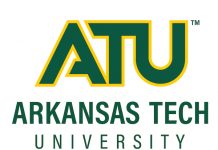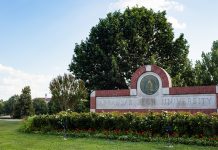Will Rogers is perhaps best remembered as a humorist, movie star, newspaper columnist and radio commentator.
During a ceremony in front of John E. Tucker Coliseum in Russellville on the morning of Wednesday, June 15, Rogers was remembered as something else — a humanitarian.
Arkansas Tech University rededicated a monument to Will Rogers that commemorates a visit he made to campus to provide relief for unemployed workers displaced by what we now know as the Great Depression.
The refurbished memorial was made possible through a cooperative effort by the Arkansas Humanities Council and Arkansas Tech.
The monument was unveiled by the three speakers at the ceremony: Dr. Thomas DeBlack, professor of history in the Arkansas Tech Department of History and Political Science; Tad Jones, director of the Will Rogers Memorial Museum in Claremore, Okla.; and Dr. Jeff Woods, dean of the Arkansas Tech College of Arts and Humanities.
“More than any single event, I think this marker celebrates the spirit of philanthropy and civic engagement that Rogers embodied and we hope to inspire here at Arkansas Tech,” said Woods.
The monument rededicated on Wednesday consists of three plaques that were placed in memory of Rogers and to leave a record of his 1931 visit to campus. The show at Tech’s National Guard Armory was part of a tour of the southern United States that Rogers undertook in an effort to bring relief to regions struggling through the Great Depression.
Rogers’ performance in Russellville raised more than $2,000, which was used to provide payment for laborers to construct a municipal airport. The airport was built on the same parcel of land where Tucker Coliseum now sits.
Jones spoke on Wednesday of the fact that the Will Rogers Museum continues to learn of historical markers located around the United States that commemorate similar acts of philanthropy by the famed humorist in areas as nearby as his native Oklahoma and as far away as Nicaragua.
“I think it’s hard for us to imagine how popular he was as a person,” said Jones. “He was literally the No. 1, most read newspaper columnist of his day. He was in more than 400 newspapers. He was the No. 1 movie star in the United States in 1933 and 1934. He was the most listened to radio commentator. As a matter of fact, churches on Sunday night had to move their services around so that the congregation could listen to him on the radio and then come to church.
“(Rogers) loved his country and his fellow man,” continued Jones. “When they dedicated the Will Rogers Memorial in 1938, one of the things Eddie Cantor said about him was that he didn’t care about your religion or your color…he appreciated you as a human being. That is definitely a message our country needs to hear today. One of our efforts is to share Will Rogers with as many people as we can as an example of how to be a good American and a good human being.”
DeBlack shared with those in attendance on Wednesday a full-page advertisement that ran in the Courier-Democrat newspaper of Russellville prior to Rogers’ visit to Arkansas Tech.
According to the ad, the admission price for the 1931 event was $5 for reserved seating on the stage, $2.50 for seats in the front section, $1 for general admission and 50 cents for Tech students and children.
DeBlack also read from the Courier-Democrat’s article that recapped Rogers’ address in front of 3,000 onlookers at Arkansas Tech. The article stated that Russellville was “deserted” by 7:30 a.m. on the day of the address because everyone was at the armory in an effort to secure a seat.
“It was Russellville and this vicinity’s big morning, and the people turned out en masse to hear the cowboy humorist speak,” reads a portion of the article. “The house was with him from the start. He was their own Will, come to help them in an emergency. He could have said anything, and they would’ve liked it. He was theirs. That was enough.”
Those in attendance at the rededication ceremony on Wednesday included Paul Austin, executive director of the Arkansas Humanities Council; David Vance of Russellville, whose grandfather was among the sponsors of the Rogers’ appearance at Arkansas Tech; and a number of Arkansas Tech alumni, faculty, staff and supporters.
“This memorable day and this marker, to a large extent, have become obscured,” said DeBlack. “We hope that this cleaning up and rededication of the marker will honor this outstanding American.”





